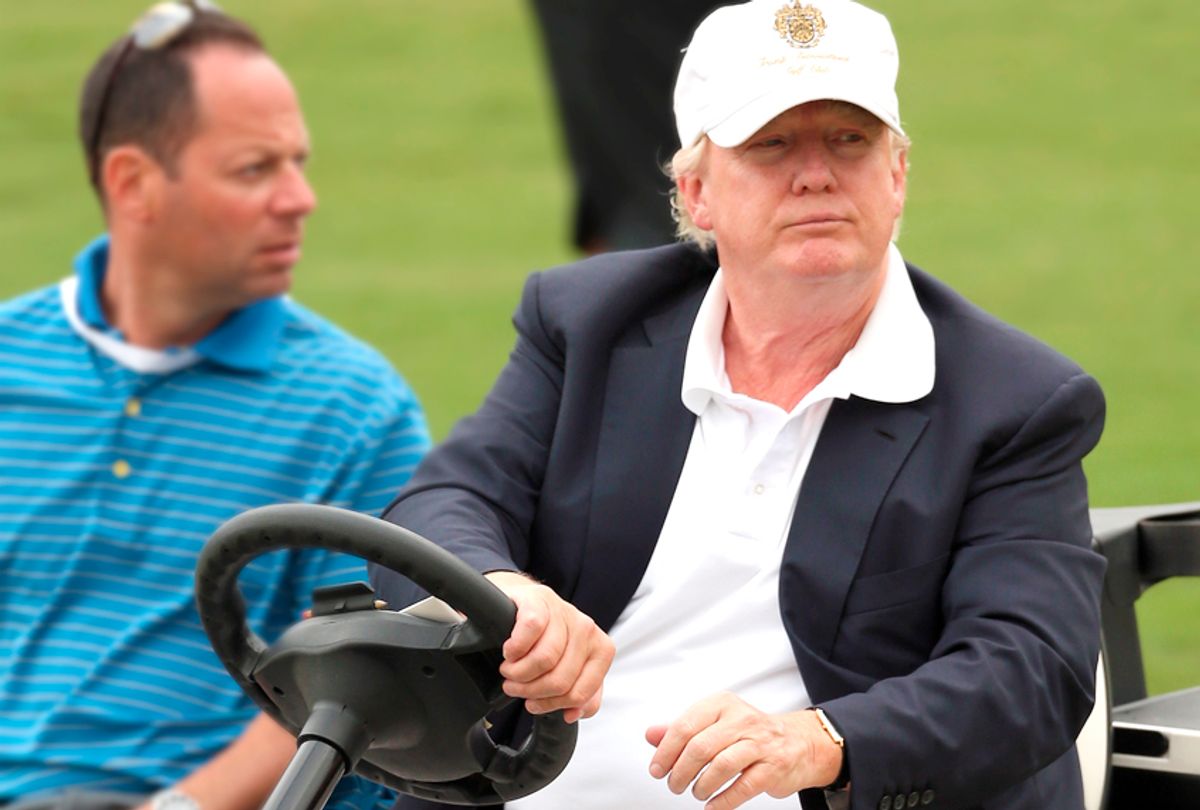President Donald Trump missed a conference call with top officials about his order to freeze military aid to Ukraine to play golf with professional player John Daly on the same day that the whistleblower complaint which triggered his impeachment was filed.
Trump’s decision set off a frenzy behind the scenes as some aides scrambled to justify the move, while others pushed to change his mind, according to an extensive New York Times report detailing what happened inside the administration following the president’s directive.
Trump first asked to freeze the aid in June. The order led Russel Vought, the acting director of the Office of Management and Budget, to search on Google for a right-wing Washington Examiner article, which appears to have prompted Trump’s decision.
Trump aide Robert Blair warned acting White House chief of staff Mick Mulvaney to “expect Congress to become unhinged” if the administration blocked aid appropriated by lawmakers. He also arguesd that the president's move could “fuel the narrative that Mr. Trump was pro-Russia,” according to The Times.
Blair’s warning did not stop the aid freeze nor did pleas from Defense Secretary Mark Esper, Secretary of State Mike Pompeo and then-national security adviser John Bolton at a previously unreported Oval Office meeting, according to the report.
As Trump resisted pleas from his own Cabinet officials, lawyers at the Office of Management and Budget reportedly hatched a previously unreported argument that Trump's role as commander in chief of the armed forces “would simply allow him to override Congress on the issue.”
While White House lawyers attempted to come up with a legal justification for the move, Trump continued to communicate with his personal attorney, Rudy Giuliani, who was leading a search for damaging information on former Vice President Joe Biden in Ukraine. Mulvaney repeatedly left the room when Trump would speak with Giuliani, leaving him with limited knowledge of Trump’s efforts in Ukraine, according to the report. Mulvaney did not learn about Trump’s infamous July 25 call with Ukrainian President Volodymyr Zelensky, on which he pressed his European counterpart for an investigation into Biden, until weeks later.
The decision led to much confusion behind the scenes as aides struggled to find a legal way to block aid which was required to go to Ukraine. Mike Duffey, a Mulvaney ally and top political appointee at the Office of Management and Budget (OMB), pressed then-acting OMB Director Mark Sandy to attach a footnote to a routine budget document temporarily blocking the aid. Sandy was concerned about the move, because it might violate a federal law the prevents the administration from blocking congressionally-approved funding, according to the report.
The hold set off alarm bells inside the administration. In July, multiple administration sources reached out to the House Foreign Affairs Committee to inform them of the hold, which had not been announced publicly nor disclosed to Congress.
Trump made his infamous July 25 call to Zelensky a week later. Just 90 minutes after the call, Duffey told Sandy to keep freezing the aid, according to emails obtained by the Center for Public Integrity. The White House removed Sandy's authority to oversee the aid freeze later that month, with Duffey replacing him as the official in charge. Sandy later testified to Congress that two OMB aides had quit over subsequent disputes about the aid.
Pentagon budget official Elaine McCusker warned the administration that at least $61 million of the aid had to be released by August 12 — or it would be lost. Trump spent the weekend before the Pentagon deadline at his New Jersey golf course. Mulvaney reportedly tried to use the weekend to schedule a conference call with Trump, Vought, Bolton and White House counsel Pat Cipollone to discuss the aid as McCusker pushed for a decision.
The call never happened, because Trump was set to hit the golf course with Daly, according to The Times. Trump eventually spoke to Mulvaney while at Bedminster, reiterating his desire to keep the freeze in place. The whistleblower filed the complaint which ultimately led to Trump’s impeachment that same day.
The aid freeze was first reported by Politico less than two weeks later, prompting Esper, Pompeo and Bolton to try to convince Trump to change his mind in the Oval Office, according to The Times. That move was unsuccessful.
“Ukraine is a corrupt country,” the president reportedly said. “We are pissing away our money.”
By the end of August, Trump was briefed on the whistleblower complaint. The White House was still working on a legal justification for the aid freeze when Trump when a phone call with Sen. Rob Portman, R-Ohio, unexpectedly changed his mind.
“I have no doubt about why the president allowed the assistance to go forward,” Rep. Eliot Engel, D-N.Y., the chairman of the House Foreign Affairs Committee, told The Times. “He got caught.”
Senate Minority Leader Chuck Schumer, D-N.Y., said The Times report shows the need for the Senate to call witnesses like Mulvaney at Trump’s impeachment trial.
“Every Republican Senator must read this and then explain why they would oppose our reasonable request for witnesses and documents in the Senate trial,” he tweeted. “This makes the choice even more clear: Will the Senate hold a fair trial, or will it enable a cover-up?”



Shares